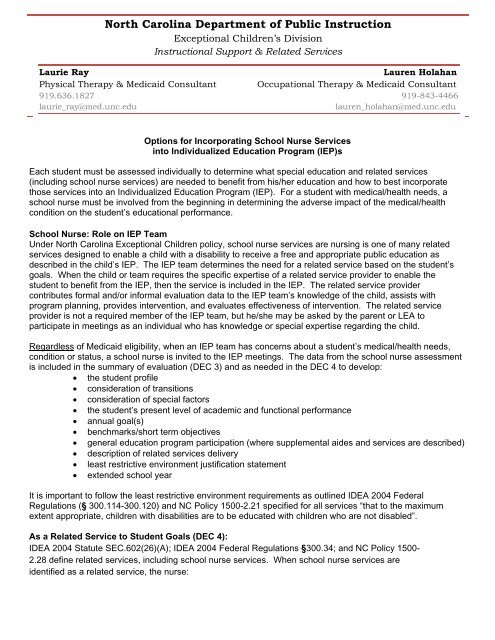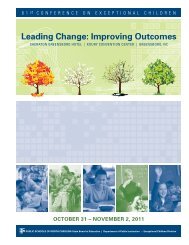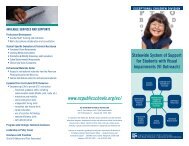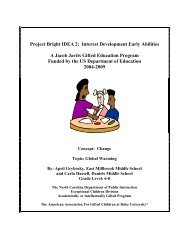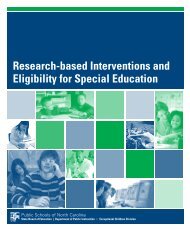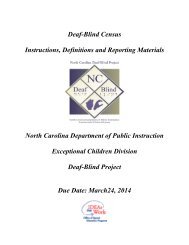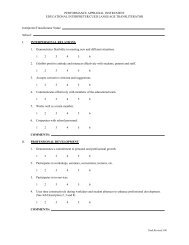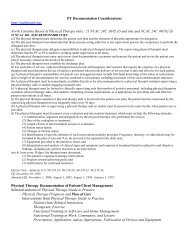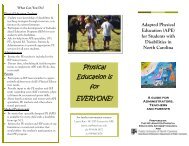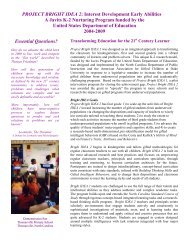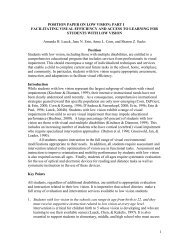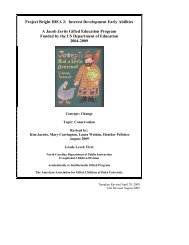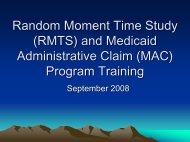Incorporating Nursing into IEPs - Exceptional Children
Incorporating Nursing into IEPs - Exceptional Children
Incorporating Nursing into IEPs - Exceptional Children
You also want an ePaper? Increase the reach of your titles
YUMPU automatically turns print PDFs into web optimized ePapers that Google loves.
North Carolina Department of Public Instruction<br />
<strong>Exceptional</strong> <strong>Children</strong>’s Division<br />
Instructional Support & Related Services<br />
Laurie Ray<br />
Lauren Holahan<br />
Physical Therapy & Medicaid Consultant Occupational Therapy & Medicaid Consultant<br />
919.636.1827 919-843-4466<br />
laurie_ray@med.unc.edu<br />
lauren_holahan@med.unc.edu<br />
Options for <strong>Incorporating</strong> School Nurse Services<br />
<strong>into</strong> Individualized Education Program (IEP)s<br />
Each student must be assessed individually to determine what special education and related services<br />
(including school nurse services) are needed to benefit from his/her education and how to best incorporate<br />
those services <strong>into</strong> an Individualized Education Program (IEP). For a student with medical/health needs, a<br />
school nurse must be involved from the beginning in determining the adverse impact of the medical/health<br />
condition on the student’s educational performance.<br />
School Nurse: Role on IEP Team<br />
Under North Carolina <strong>Exceptional</strong> <strong>Children</strong> policy, school nurse services are nursing is one of many related<br />
services designed to enable a child with a disability to receive a free and appropriate public education as<br />
described in the child’s IEP. The IEP team determines the need for a related service based on the student’s<br />
goals. When the child or team requires the specific expertise of a related service provider to enable the<br />
student to benefit from the IEP, then the service is included in the IEP. The related service provider<br />
contributes formal and/or informal evaluation data to the IEP team’s knowledge of the child, assists with<br />
program planning, provides intervention, and evaluates effectiveness of intervention. The related service<br />
provider is not a required member of the IEP team, but he/she may be asked by the parent or LEA to<br />
participate in meetings as an individual who has knowledge or special expertise regarding the child.<br />
Regardless of Medicaid eligibility, when an IEP team has concerns about a student’s medical/health needs,<br />
condition or status, a school nurse is invited to the IEP meetings. The data from the school nurse assessment<br />
is included in the summary of evaluation (DEC 3) and as needed in the DEC 4 to develop:<br />
• the student profile<br />
• consideration of transitions<br />
• consideration of special factors<br />
• the student’s present level of academic and functional performance<br />
• annual goal(s)<br />
• benchmarks/short term objectives<br />
• general education program participation (where supplemental aides and services are described)<br />
• description of related services delivery<br />
• least restrictive environment justification statement<br />
• extended school year<br />
It is important to follow the least restrictive environment requirements as outlined IDEA 2004 Federal<br />
Regulations (§ 300.114-300.120) and NC Policy 1500-2.21 specified for all services “that to the maximum<br />
extent appropriate, children with disabilities are to be educated with children who are not disabled”.<br />
As a Related Service to Student Goals (DEC 4):<br />
IDEA 2004 Statute SEC.602(26)(A); IDEA 2004 Federal Regulations §300.34; and NC Policy 1500-<br />
2.28 define related services, including school nurse services. When school nurse services are<br />
identified as a related service, the nurse:
• Collaborates with IEP team to write academic and/or functional goal(s) that require(s) school<br />
nurse services to increase student’s independence or develop student’s skills for self care,<br />
health management, etc.<br />
• Integrates school nurse services <strong>into</strong> student goal written by teacher or other related service<br />
provider<br />
• Addresses goals requiring specified time, frequency and location to be documented in the<br />
IEP<br />
• Writes progress reports on goals necessitating school nurse services for parents and EC<br />
file (according to scheduled reporting periods by LEA)<br />
As a Related Service referring to Individualized Health Plan (IHP):<br />
When school nurse services are identified as a related service and tied to the student’s IHP, the<br />
nurse:<br />
• Refers to the IHP, available to the parents/family, nurse, doctor and other appropriate<br />
personnel, to indicate treatment plan and objectives which require school nurse services to<br />
support the student’s access to his/her education<br />
• Specifies time, frequency and location needed to support the student’s IHP which is<br />
documented in the IEP<br />
As a Supplementary Aids and Services:<br />
IDEA 2004 Statute SEC. 602 (33); IDEA 2004 Federal Regulations §300.42; and NC Policy 1500-2.36<br />
describes Supplementary Aids and Services. When school nurse services are identified as a supplementary<br />
aid/service, the IEP team:<br />
• Indicates services needed to ensure access and learning in the general education classes,<br />
non-academic services and activities (e.g. lunch, recess, media center, assemblies, field<br />
trips, etc.)<br />
• Documents who, what, when and where these services will be provided to the student<br />
• Consults Medicaid policy for LEAs to determine whether cost recovery is appropriate for the<br />
provided service(s) http://www.dhhs.state.nc.us/dma/bh/8h.pdf<br />
As Technical Assistance:<br />
IDEA 2004 Statute SEC. 611 (e)(2)(C)(i); IDEA 2004 Federal Regulations §300.119; and NC<br />
Policy 1501-3.6. When school nurse services are identified as technical assistance, the IEP<br />
team:<br />
• Indicates training for general education teacher(s) and/or other school personnel that is<br />
required to ensure student’s access to his/her educational program (e.g. plan for allergic<br />
reactions or asthma, seizure plan, etc.)<br />
• Consults Medicaid policy for LEAs to determine whether cost recovery is appropriate for the<br />
provided service(s)http://www.dhhs.state.nc.us/dma/bh/8h.pdf<br />
Related Service Support Description (RSSD):<br />
• School nurse services are not approved to use this description at this time<br />
• Services provided under a RSSD are not eligible for cost recovery from Medicaid


